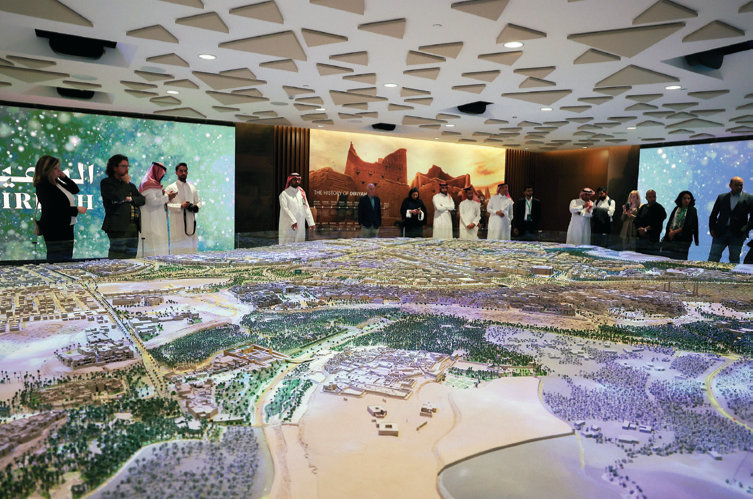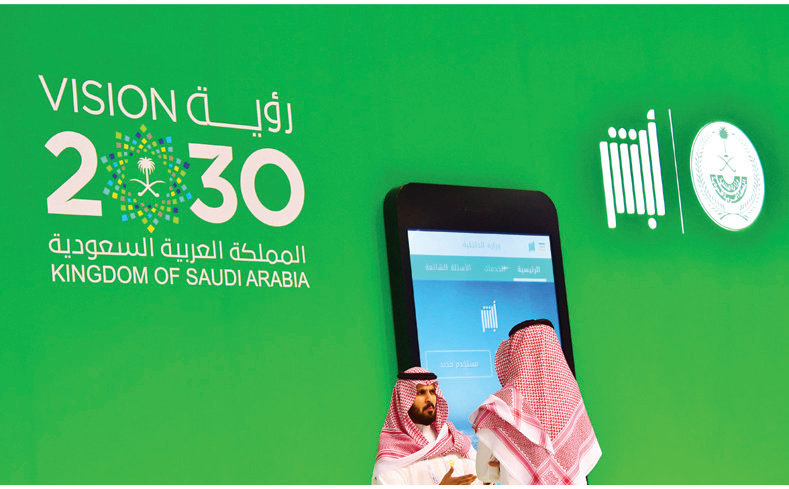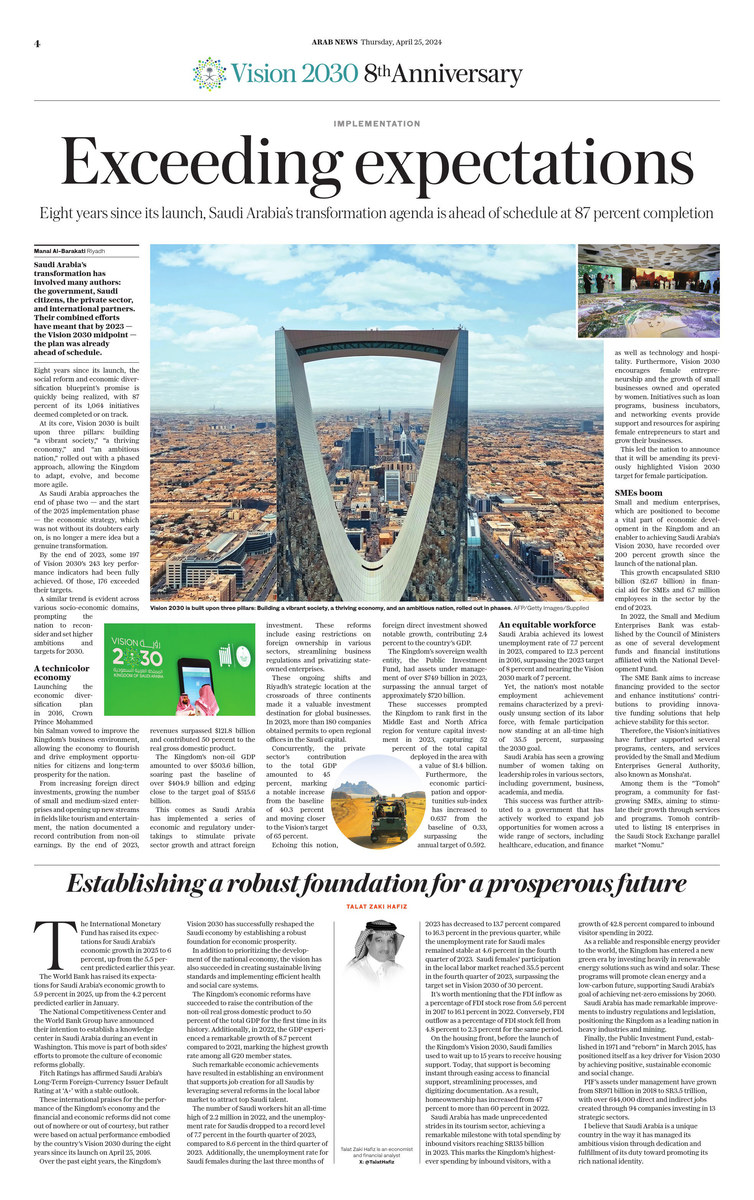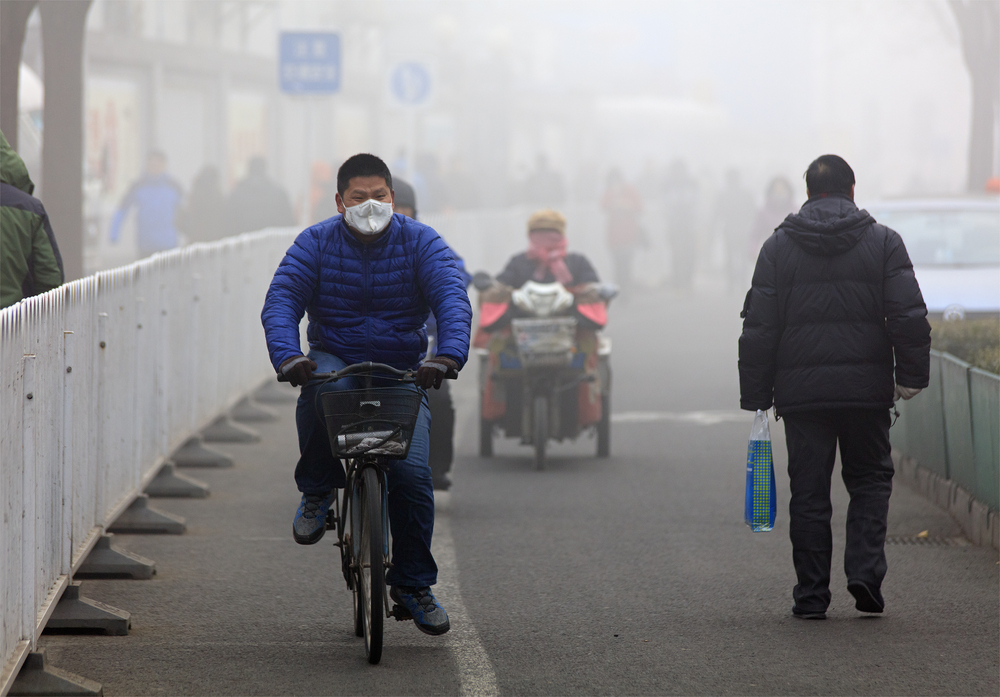RIYADH: Saudi Arabia’s transformation has involved many authors: The government, Saudi citizens, the private sector, and international partners. Their combined efforts have meant that by 2023 — the Vision 2030 midpoint — the plan was already ahead of schedule.
Eight years since its launch, the social reform and economic diversification blueprint’s promise is quickly being realized, with 87 percent of its 1,064 initiatives deemed completed or on track.
At its core, Vision 2030 is built upon three pillars: Building “a vibrant society,” “a thriving economy,” and “an ambitious nation,” rolled out with a phased approach, allowing the Kingdom to adapt, evolve, and become more agile.
As Saudi Arabia approaches the end of phase two — and the start of the 2025 implementation phase — the economic strategy, which was not without its doubters early on, is no longer a mere idea but a genuine transformation.

Eight years since the Kingdom's social reform and economic diversification blueprint was launched, 87 percent of the 1,064 initiatives are deemed completed or on track. (Getty Imaes/AFP)
By the end of 2023, some 197 of Vision 2030’s 243 key performance indicators had been fully achieved. Of those, 176 exceeded their targets.
A similar trend is evident across various socio-economic domains, prompting the nation to reconsider and set higher ambitions and targets for 2030.
A technicolor economy
Launching the economic diversification plan in 2016, Crown Prince Mohammed bin Salman vowed to improve the Kingdom’s business environment, allowing the economy to flourish and drive employment opportunities for citizens and long-term prosperity for the nation.
From increasing foreign direct investments, growing the number of small and medium-sized enterprises and opening up new streams in fields like tourism and entertainment, the nation documented a record contribution from non-oil earnings.
By the end of 2023, revenues surpassed $121.8 billion and contributed 50 percent to the real gross domestic product.
The Kingdom’s non-oil GDP amounted to over $503.6 billion, soaring past the baseline of over $404.9 billion and edging close to the target goal of $515.6 billion.
This comes as Saudi Arabia has implemented a series of economic and regulatory undertakings to stimulate private sector growth and attract foreign investment. These reforms include easing restrictions on foreign ownership in various sectors, streamlining business regulations and privatizing state-owned enterprises.
These ongoing shifts and Riyadh’s strategic location at the crossroads of three continents made it a valuable investment destination for global businesses. In 2023, more than 180 companies obtained permits to open regional offices in the Saudi capital.

Saudi Arabia's economic diversification plan has allowed the economy to flourish and drive employment opportunities for citizens. (Supplied)
Concurrently, the private sector’s contribution to the total GDP amounted to 45 percent, marking a notable increase from the baseline of 40.3 percent and moving closer to the Vision’s target of 65 percent.
Echoing this notion, foreign direct investment showed notable growth, contributing 2.4 percent to the country’s GDP.
The Kingdom’s sovereign wealth entity, the Public Investment Fund, had assets under management of over $749 billion in 2023, surpassing the annual target of approximately $720 billion.
These successes prompted the Kingdom to rank first in the Middle East and North Africa region for venture capital investment in 2023, capturing 52 percent of the total capital deployed in the area with a value of $1.4 billion.
Furthermore, the economic participation and opportunities sub-index has increased to 0.637 from the baseline of 0.33, surpassing the annual target of 0.592.

An equitable workforce
Saudi Arabia achieved its lowest unemployment rate of 7.7 percent in 2023, compared to 12.3 percent in 2016, surpassing the 2023 target of 8 percent and nearing the Vision 2030 mark of 7 percent.
Yet, the nation’s most notable employment achievement remains characterized by a previously unsung section of its labor force, with female participation now standing at an all-time high of 35.5 percent, surpassing the 2030 goal.
Saudi Arabia has seen a growing number of women taking on leadership roles in various sectors, including government, business, academia, and media.
This success was further attributed to a government that has actively worked to expand job opportunities for women across a wide range of sectors, including healthcare, education, and finance as well as technology and hospitality.
Furthermore, Vision 2030 encourages female entrepreneurship and the growth of small businesses owned and operated by women. Initiatives such as loan programs, business incubators, and networking events provide support and resources for aspiring female entrepreneurs to start and grow their businesses.
This led the nation to announce that it will be amending its previously highlighted Vision 2030 target for female participation.
SME boom
Small and medium enterprises, which are positioned to become a vital part of economic development in the Kingdom and an enabler to achieving Saudi Arabia’s Vision 2030, have recorded over 200 percent growth since the launch of the national plan.
This growth encapsulated SR10 billion ($2.67 billion) in financial aid for SMEs and 6.7 million employees in the sector by the end of 2023.
In 2022, the Small and Medium Enterprises Bank was established by the Council of Ministers as one of several development funds and financial institutions affiliated with the National Development Fund.
The SME Bank aims to increase financing provided to the sector and enhance institutions’ contributions to providing innovative funding solutions that help achieve stability for this sector.
Therefore, the Vision’s initiatives have further supported several programs, centers, and services provided by the Small and Medium Enterprises General Authority, also known as Monsha’at.
Among them is the “Tomoh” program, a community for fast-growing SMEs, aiming to stimulate their growth through services and programs. Tomoh contributed to listing 18 enterprises in the Saudi Stock Exchange parallel market “Nomu.”



























